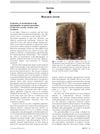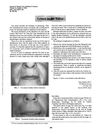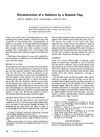March 1999 in “Hair transplant forum international” The American Board of Hair Restoration Surgery is a certification for doctors specializing in hair restoration procedures.
 June 2008 in “Dermatologic Surgery”
June 2008 in “Dermatologic Surgery” The International Society of Hair Restoration Surgery created a standard curriculum in 2008 to guide doctors in diagnosing and treating hair loss effectively.
 6 citations,
December 2021 in “Journal of The American Academy of Dermatology”
6 citations,
December 2021 in “Journal of The American Academy of Dermatology” Scalp photography helps patients feel less anxious about hair loss, agree more with doctors on severity, and stay motivated for treatment.
 3 citations,
August 2017 in “PubMed”
3 citations,
August 2017 in “PubMed” A man got a scalp infection from synthetic hair implants because the procedure wasn't done by a doctor and was poorly managed.
 1 citations,
July 2017 in “PubMed”
1 citations,
July 2017 in “PubMed” Hair loss can have negative psychological effects and treating it needs teamwork, especially from skin doctors.
 1 citations,
August 2013 in “Facial Plastic Surgery Clinics of North America”
1 citations,
August 2013 in “Facial Plastic Surgery Clinics of North America” Hair restoration has evolved into a refined art, providing happiness to patients and doctors.
 1 citations,
July 1999 in “Plastic and Reconstructive Surgery”
1 citations,
July 1999 in “Plastic and Reconstructive Surgery” The article discusses how to fix bad results from hair restoration surgery, with different doctors suggesting methods like adding more grafts, moving transplanted hair, or using smaller grafts.
 May 2017 in “Hair transplant forum international”
May 2017 in “Hair transplant forum international” To prevent infections after hair restoration surgery, keep the area clean and follow your doctor's care instructions.

The ISHRS provides guidelines for hair restoration surgery virtual consultations, but doctors should make decisions based on individual patient needs and local laws.
 June 2011 in “The Journal for Nurse Practitioners”
June 2011 in “The Journal for Nurse Practitioners” Up to half of adult women may experience hair loss, and doctors should use medical history, exams, and tests to find the cause and treat it.
31 citations,
November 2009 in “European journal of dermatology/EJD. European journal of dermatology” Experts made a guide to help doctors evaluate women with too much hair growth.
 7 citations,
January 2012 in “International Journal of Trichology”
7 citations,
January 2012 in “International Journal of Trichology” A man with Woolly Hair Syndrome had very curly, fragile hair, and doctors used a special scalp examination to diagnose him without invasive tests.
 4 citations,
January 2021 in “Dermatologic Therapy”
4 citations,
January 2021 in “Dermatologic Therapy” AI is effective in diagnosing and treating hair disorders, including detecting hair loss and scalp conditions with high accuracy, but it should supplement, not replace, doctor-patient interactions.
 2 citations,
July 2018 in “Elsevier eBooks”
2 citations,
July 2018 in “Elsevier eBooks” Some supplements may help with hair loss, but there's not enough strong evidence to recommend them without doctor advice.
 1 citations,
January 2002 in “Health care on the Internet”
1 citations,
January 2002 in “Health care on the Internet” The article says Rogaine and Propecia can treat hair loss, warns about unreliable internet info, and advises talking to a doctor before using hair loss products.
 January 2017 in “International journal of transplantation & plastic surgery”
January 2017 in “International journal of transplantation & plastic surgery” Hair restoration techniques have improved over time, focusing on better results and less scarring, but skilled doctors are essential for natural-looking outcomes.
 3 citations,
May 2002 in “Therapeutische Umschau”
3 citations,
May 2002 in “Therapeutische Umschau” The document concluded that cyproterone acetate and minoxidil are effective for female hair loss, and a supportive doctor-patient relationship is important.
 1 citations,
December 1996 in “Journal of Clinical Laser Medicine & Surgery”
1 citations,
December 1996 in “Journal of Clinical Laser Medicine & Surgery” A doctor describes a new, less expensive method for treating skin issues with a laser, and another doctor corrects a false claim about hair transplantation results.
 22 citations,
May 2012 in “Dermatologic Therapy”
22 citations,
May 2012 in “Dermatologic Therapy” Doctors should suggest hair replacement based on personal needs and stress scalp cleanliness to avoid skin problems.
 15 citations,
September 2015 in “Journal der Deutschen Dermatologischen Gesellschaft”
15 citations,
September 2015 in “Journal der Deutschen Dermatologischen Gesellschaft” Skin doctors should recognize and treat conditions like hair-pulling and skin-picking early, often using therapy and medication, to help 50-70% of patients.
 8 citations,
September 2015 in “Hair transplant forum international”
8 citations,
September 2015 in “Hair transplant forum international” Doctors reported that Follicular Unit Transplantation (FUT) still gives some of the best hair transplant results.
 8 citations,
March 2011 in “Archives of Dermatology”
8 citations,
March 2011 in “Archives of Dermatology” Doctors don't use trichoscopy enough, even though it's good for diagnosing hair problems.
 5 citations,
March 2017 in “Journal of Dermatology”
5 citations,
March 2017 in “Journal of Dermatology” Patients and doctors find current hair loss treatments unsatisfying and believe involving patients in decisions improves results.
 1 citations,
May 2021 in “Journal Für Ästhetische Chirurgie”
1 citations,
May 2021 in “Journal Für Ästhetische Chirurgie” Doctors should thoroughly inform hair transplant patients about the procedure, risks, and costs to prevent dissatisfaction and legal issues.
 1 citations,
March 2016 in “Health Communication”
1 citations,
March 2016 in “Health Communication” Health experts should not ignore their own health issues and seeking treatment is important for their well-being and work.
 1 citations,
June 1979 in “The Journal of Dermatologic Surgery and Oncology”
1 citations,
June 1979 in “The Journal of Dermatologic Surgery and Oncology” Doctors successfully rebuilt a sideburn using skin and hair from near the ear in one surgery.

Human hair keratins can self-assemble and support cell growth, useful for biomedical applications.

Doctors should consider Netherton syndrome in patients with chronic skin and hair issues to avoid misdiagnosis.
 September 2016 in “British Journal of Dermatology”
September 2016 in “British Journal of Dermatology” Doctors need more training in skin cancer screening, a new treatment is effective for a skin condition, better diagnosis methods for skin cancer are available, hair loss in women may be linked to hormones and cholesterol, certain skin care products might cause hair loss, babies' skin gets weaker after birth, and a gene mutation might be linked to eczema.

Doctors disagree on whether Raynaud phenomenon often leads to serious diseases, but agree that patients should be monitored for possible progression while being reassured. Rapid weight loss may cause hair loss.



























